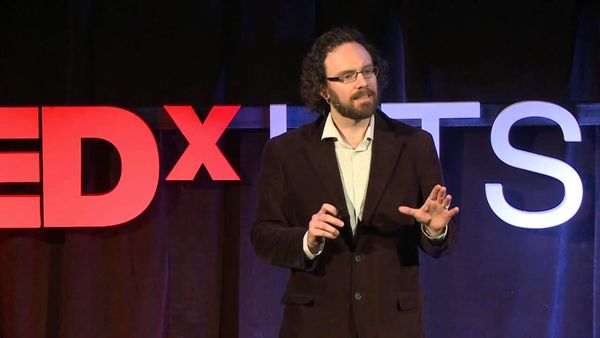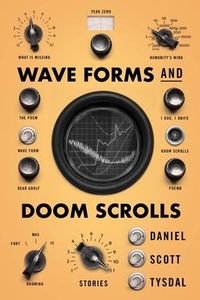The Writing Moment with... Word Service
By Daniel Scott Tysdal
“A waste of skin.”
That’s what I am.
At least according to the Starbucks customer who hurled this insult (and others) at me, when I informed her we were out of honey.
According to various customers at my different service jobs, to whom I have provided drinks, meals, and coffee, I am also: “a good listener,” “a lifesaver,” “a shill,” “the best bartender,” “the worst bartender,” fuel for the threat (on multiple occasions) “you wanna step outside, pal?” (I did not, in fact, ever step outside), in possession of “the first real smile” a distraught young woman had seen in weeks, and inspiration for the moniker “Fabio, the most handsomest man at Starbucks.” That regular customer, it’s worth noting, who joyously exclaimed his compliment every visit, pointing at me with both hands like a proud father, remains my all-time favourite. (Sorry “Waste of Skin” Lady, you didn’t stand a chance.)
I think about the idea and practice of service a lot because of the extreme experiences crystallized in these interactions. Bartending was the first job I was good at: the first to feel like a calling, and I valued the community and connection, the creativity and the joy. On the flipside of this, bartending—and the various service jobs that followed—also gave me first-hand experience of a twisted contradiction: that our service-dependent society relentlessly diminishes and demeans those who undertake this essential labour.
Given my work history, service influences how I approach my current job, teaching. I, no joke, draw on my Starbucks training daily—the “Just Say Yes” policy and the LATTE method (more below), especially. Taking drink orders from a half-dozen thirsty customers piled at the bar prepared me to field questions in the post-lecture crush of an exam-anxious class. Though I know this sounds sappy, I conceive of teaching as serving students—not as “customers who are always right,” but as writers answering a shared calling, keen to receive the knowledge, support, and hope I can share. In my defence, these students, and my hokey understanding of our relationship, is what keeps me going. It’s what keeps me going as, year after year, I grow more exhausted by, and helpless in the face of, the institution: its petty politics, enabling of abusers, unethical investments, and corrupt, censure-earning hiring practices.
I’m willing to bet service has been on your mind recently, too. It’s one of the uniting threads of the multiple local and global issues that demand our attention and action as we begin Year 2 of our global pandemic. Service industry workers, deemed essential, are forced into life-threatening situations, offered more abuse in place of more pay. Anti-mask, anti-vaxxers march in service of themselves, disdainful of any responsibility to a larger community. For those not already in the know, politicians admit—inept action after failed half-measure—who they really serve, while violence and murder committed under the guise of “protection” by police and military services remains an essential engine of colonizer states.
I have jotted down these thoughts on service because, for a month, I have failed to write this column. With each new attempt, I faltered—helpless, exhausted—in the face of that old but never more timely question: what purpose does this serve?
Seriously, what purpose could this possibly serve?
I have not answered this question in a satisfactory way here. But I have managed to cobble together a trio of potential purposes, however meagre they might be, that helped me write this piece.
Your CanLit News
Subscribe to Open Book’s newsletter to get local book events, literary content, writing tips, and more in your inbox
The first purpose is to write this column so I can donate the payment to the Palestinian Youth Movement. I have also donated the payment for my first column, on Natasha Ramoutar’s Bittersweet, to Scarborough Mutual Aid. I will donate future payments to causes relevant to each Writing Moment post.
The second purpose is to encourage you, your voices, and your characters to write about and reflect on your dynamic experiences of and relationships to service, your different communities, duties, and responsibilities, your various practices and actions.
The final and related purpose is to get hokey again and give us the chance to proclaim together our commitment to words, to word service, to the service of words. Let’s follow the orders of words as we order our words. Let’s remember that in really listening to words—our own and the words of others—experiencing the histories and possibilities words contain, the healing and the hurt they preserve and share, we can mark out the truths and imaginings that guide us to create a more just and dazzling world.
What follows, then, are a selection of writing moments arising from the word “service,” composed by, as the old saying goes, your faithful servant. Or, to put it another way and draw on my past service industry selves, here are some spurs to serve service from this wannabe Fabio, this pal who will step outside if he must, this tender, wasted skin.
1) In Service of Service: Explore, as I have done above, your relationship to service. What is service to you? What are its benefits and opportunities? What are its contradictions and dangers?
You may also undertake this exploration through one of your voices or characters, or, even, stage a conversation or argument between two voices or characters.
2) Not Going to Waste: You, or one of your voices or characters, has just been called “a waste of skin.” Who hurled this insult? In what context and setting? How do you respond?
You may also take a different approach: write from the perspective of the person who spit this insult. You can develop the exploration further still by having a third-party intervene, whether to calm, amplify, or introduce a new direction.
3) Does This Wand Make Me a Magician?: Every job features its own use of everyday words and its own vocabulary. At Starbucks, for example, I steamed milk with a wand and a perfect espresso shot possessed a body and a heart. I also had to awkwardly refer to my co-workers as my “partners.”
When writing about a specific job and workplace, you can utilize this language to achieve authenticity, create unique conflicts, develop distinct symbols, nurture wonder, and more. One way to practice this is to draw on past or present work experience and make a list of your workplace’s unique uses of everyday words and its distinct jargon, slang, and acronyms. Next, compose a poem, flash story, or scene in which you use every single one of these words.
4) Mis-Defining Service: The word “service” has multiple meanings. What happens when these meanings get mixed up, misapplied, or realized in impossible ways?
For example, what if a tennis “serve” was “served” like a meal? Or the reverse: a meal “served” as though the exchange between server and customer were a competition? What if military service were restaurant service or, again, the reverse?
5) The LATTE School of Art: To train their massive workforces, corporations concoct all sorts of catchphrase-dependent and acronym-heavy practices and guides. As I noted above, I still, as a teacher, draw on the Starbucks “Just Say Yes” policy (which is as simple as it sounds) and LATTE method (Listen to a customer’s problem, Acknowledge, Thank, Take Action, and Explain how you fixed the problem).
What if the “Just Say Yes” policy or LATTE method were mottos for schools of art? What sort of art would this school produce? What would be this school’s materials, practices, audiences, and goals?
Alternately, what if an arts motto (ex. “make it new” or “we are all chimeras”) or school of art (Romanticism or Dadaism) provided the training methods for a corporate workplace?
6) An Oath’s Offerings, the Powers of a Pledge: Above, I invited you to commit to the service of words, to pledge allegiance to words. If there were such a pledge to words, what would be one of its promises according to you or one of your voices or characters?
Oaths, pledges, vows, and the like are fertile genres for our poetry and our prose works. As yourself or one of your voices or characters, you can compose an oath to a cause, idea, or activity you or they deeply believe in. You can also compose an oath for an unexpected—because absurd or dangerous—cause, idea, or activity.
You could also compose a scene, story, or thread in a larger work in which characters attempt to compose a pledge or oath.
7) A Brain Hemorrhage, Please: Beverage names offer a fertile vehicle for parody and satire, especially on the topic of consumerism. Ordering a cocktail or a shot can lead one to ask for a Suffering Bastard, Brain Hemorrhage, or Sex on a Beach. Fancy coffee orders can run twenty-plus words in length and strike a bizarre balance between commercial nonsense and magic spell.
Invent twisted drinks—names and recipes—that capture the horrors of a world of mass consumerism and environmental destruction.
Imagine impossible drinks—names and recipes—that offer hope for this world, the promise of change.
8) Who Also Serves?: In “When I consider how my light is spent,” John Milton concludes: “They also serve who only stand and wait.”
In what ways, right now, does this statement ring true for you or one of your voices or characters? In what ways is it inaccurate? How would you re-phrase, swerve from, or outright counter Milton’s assertion?
I hope you enjoyed the second instalment of “The Writing Moment with . . .”.
In this series of craft-focused columns, I explore a wide range of works, topics, and interests that inspire me with the hope of inspiring you. I discuss what moves me in these different creations and practices, highlighting the spurs, lessons, and reminders that can serve as prompts and openings into creative possibility.
I call this column “The Writing Moment” because of the helpful double meaning of moment. Each of these individual prompts should only take a moment, and, I hope, each will inspire you to “have a moment,” sparking a burst of creative exploration—even on the busiest, or most reluctant, day.
You can read the first instalment here.
Stay tuned for more next month!
The views expressed by Open Book columnists are those held by the authors and do not necessarily reflect the views of Open Book.
Daniel Scott Tysdal is the ReLit Award-winning author of three books of poetry, the poetry textbook The Writing Moment: A Practical Guide to Creating Poems, and the TEDx talk, “Everything You Need to Write a Poem (and How It Can Save a Life).” His short films have screened at festivals in Canada, the US, Mexico, and Australia, and his debut short story collection, Wave Forms and Doom Scrolls, is forthcoming from Wolsak & Wynn. He teaches at the University of Toronto Scarborough.




